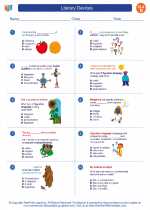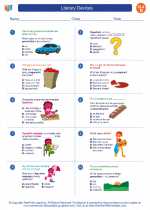Hyperbole
Hyperbole, derived from a Greek word meaning "over-casting," is a figure of speech that involves exaggeration for emphasis or effect. It is often used to create a humorous or dramatic effect and is not meant to be taken literally. Hyperboles can be found in literature, poetry, and everyday language.
Examples of Hyperbole
- "I'm so hungry I could eat a horse."
- "It took forever to finish my homework."
- "I've told you a million times to clean your room."
- "She is as thin as a toothpick."
Identifying Hyperboles
Hyperboles are often recognized by the use of extreme exaggeration. Look for statements that are not meant to be taken literally and are used to emphasize a point or create a vivid image in the reader's mind.
Studying Hyperboles
To study hyperboles, it's important to practice identifying them in various texts. Read poems, stories, and advertisements and look for instances of exaggerated statements. Consider the effect of the hyperbole on the overall message or tone of the text. Discuss with others how hyperboles contribute to the meaning and impact of the writing.
It can also be helpful to create your own hyperboles. Practice using exaggerated statements in your own writing to emphasize a point or create a humorous effect. Share your hyperboles with others and discuss how they contribute to the overall message of your writing.
[Hyperbole] Related Worksheets and Study Guides:
.◂English Language Arts Worksheets and Study Guides Fourth Grade. Literary Devices

 Worksheet/Answer key
Worksheet/Answer key
 Worksheet/Answer key
Worksheet/Answer key
